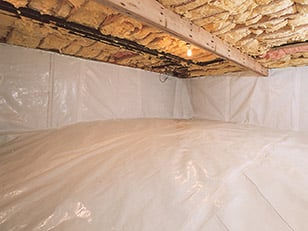Crawl Space Encapsulation: A Smart Move for Charleston, SC Homeowners
- sgonzalez2414
- Jul 22
- 3 min read
Updated: Aug 6
Charleston, SC is known for its historic charm, scenic coastline—and unfortunately, its high humidity, frequent flooding, and low-lying foundations. For homeowners living at or near sea level, these conditions can wreak havoc beneath the home if the crawl space is left unsealed.
That’s where crawl space encapsulation comes in: a proven solution that transforms damp, vulnerable crawl spaces into clean, dry, reinforced areas—boosting your home’s efficiency, strength, and health from the ground up.

What Is Crawl Space Encapsulation?
Crawl space encapsulation involves sealing the entire crawl space with a heavy-duty vapor barrier, closing off vents, and often adding spray foam insulation (typically closed-cell) along the foundation walls or rim joists. A dehumidifier may also be installed to maintain dry conditions year-round.
Why It’s Crucial in Charleston
Charleston's unique geography brings both beauty and environmental risks:
High Water Table & Flood Risk: Many homes sit just above sea level and experience heavy rainfall, storm surges, or tidal flooding.
Extreme Humidity: The warm, moist climate makes unsealed crawl spaces a magnet for mold, mildew, and wood rot.
Older Construction: Many Charleston-area homes were built without moisture barriers or insulation beneath the house.
✅ Key Benefits of Crawl Space Encapsulation
1. Moisture & Humidity Control
Charleston’s climate creates the perfect storm for damp crawl spaces. Encapsulation:
Blocks outside moisture from entering through vents and soil
Prevents condensation buildup on ductwork and joists
Reduces indoor humidity levels, especially during hot summers
Bonus: Lower humidity indoors means less strain on HVAC systems and better air quality throughout your home.
2. Mold, Mildew, & Pest Prevention
Unsealed crawl spaces are a breeding ground for mold and a haven for pests like termites and rodents. Encapsulation helps:
Eliminate conditions mold spores need to thrive
Deter wood-destroying insects by removing access to moisture
Stop pest entry points through sealed vents and barriers
3. Stronger Structure with Closed-Cell Spray Foam
Using closed-cell spray foam in the encapsulation process does more than insulate:
Adds structural rigidity to foundation walls and subflooring
Acts as a moisture and vapor barrier in one step
Ideal for flood zones—closed-cell foam doesn’t absorb water and reinforces the building envelope
This is especially important in Charleston, where foundations are regularly tested by shifting soil, standing water, and hydrostatic pressure.
4. Flood Resilience at Sea Level
Charleston homeowners often deal with water intrusion from high tides, heavy rains, or hurricanes. Encapsulation can:
Create a sealed, reinforced barrier to reduce damage from minor flooding
Prevent water vapor intrusion during high water table periods
Protect wood framing from absorbing water and weakening over time
5. Improved Indoor Air Quality
Did you know up to 50% of the air in your home comes from the crawl space? Sealing and dehumidifying that space means:
Fewer allergens, dust mites, and mold spores circulating inside
A noticeable reduction in musty odors
A healthier home for families with asthma or allergies
6. Lower Energy Bills
By sealing off air leaks and adding insulation, crawl space encapsulation:
Prevents HVAC systems from working overtime in hot, humid air
Helps maintain a more stable indoor temperature
Can reduce energy bills by up to 20% in Charleston’s climate
7. Increased Home Value & Longevity
Encapsulation is an investment that pays off:
Adds resale value by improving structural health and energy efficiency
Reduces risk of costly repairs from mold, termites, or wood rot
Shows buyers your home is well-maintained and flood-conscious
⚠️ Don’t Wait for Water Damage to Act
If you’ve noticed musty smells, standing water, buckling floors, or visible mold under your home—your crawl space is calling for help.
Given Charleston’s unique climate and coastal vulnerabilities, crawl space encapsulation is not just a home upgrade—it’s a critical layer of protection that keeps your foundation dry, your home strong, and your family healthy.
Ready to protect your Charleston home from the ground up? Talk to a local insulation expert about closed-cell spray foam and encapsulation options tailored to your foundation type, flood zone, and long-term goals.



Comments